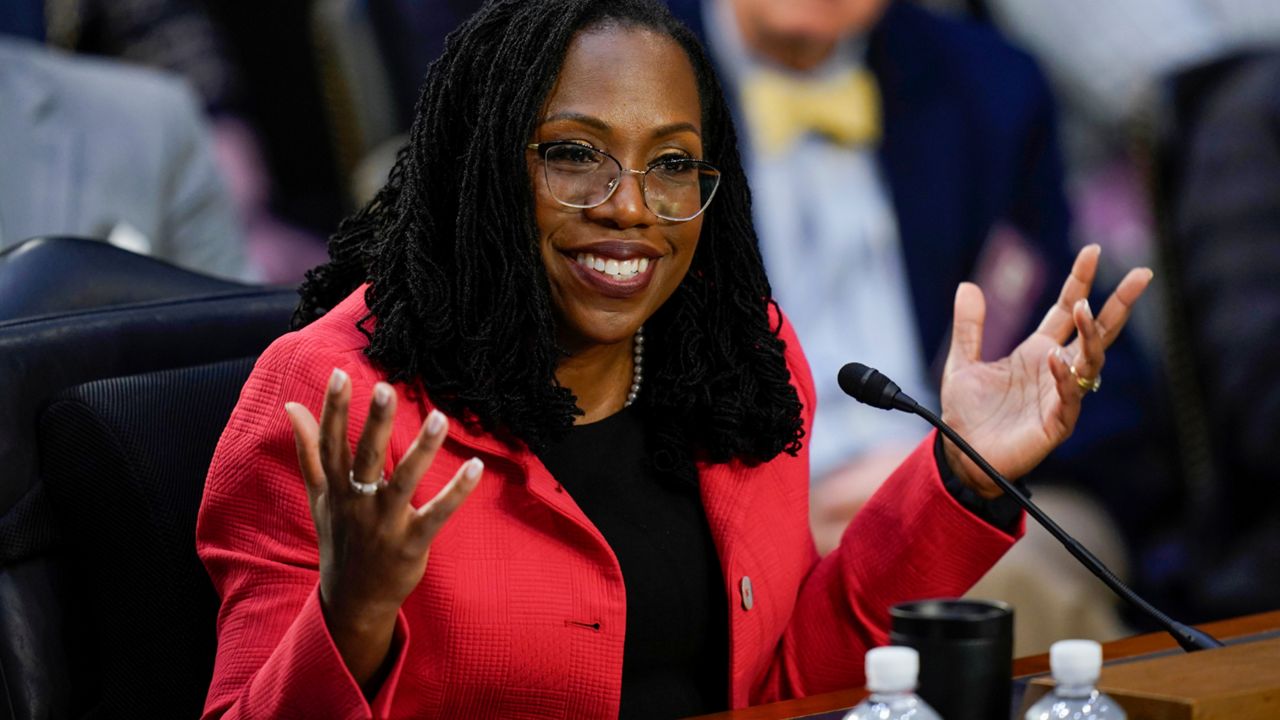The Senate Judiciary Committee will consider Judge Ketanji Brown Jackson’s nomination to the Supreme Court on Monday, starting the process for all 100 U.S. senators to vote on whether she should become the first Black woman to sit on the nation’s highest court.
The 22-senator committee, chaired by Sen. Dick Durbin, D-Ill., will send its recommendation – to confirm, reject or issue no comment – on Jackson’s nomination to the full Senate. Even if the committee deadlocks, with none of the 11 Republican senators having yet voiced support for Jackson, Democrats would likely still be able to push through her confirmation.
“A tie vote doesn’t stop us,” Durbin said last week. “It slows us down on the floor for a few hours, but it doesn’t stop us.”
Congress has a few options should lawmakers deadlock on Jackson’s nomination. The committee would hold a vote to send Jackson’s nomination to the full Senate, and it’s possible a member who voted against her nomination could, nonetheless, opt to send the issue before the full Senate for a vote.
Alternatively, should no Republican change their vote, new Senate rules adopted in the 117th Congress would allow Senate Majority Leader Chuck Schumer, D-N.Y., to file a motion to move Jackson’s nomination out of the committee, which would require a majority affirmative vote from the entire Senate. Only then would the body be able to fully consider and vote on Jackson’s nomination.
The Senate has, in the past, allowed Supreme Court nominees to proceed to a full floor vote even if they were not recommended by the Judiciary Committee. In 1987, the Judiciary Committee – chaired by then-Sen. Joe Biden – voted to recommend Robert Bork “unfavorably” to the Senate, which ultimately rejected Bork’s nomination on a 58-42 vote.
In 1991, Biden’s judiciary committee deadlocked on Clarence Thomas’ nomination, although it did opt to send his nomination to the full Senate for a vote. The Senate ultimately voted 52-48 in favor of confirming him as a Supreme Court justice.
Should Jackson’s nomination advance out of committee, the full Senate would then vote on whether to send her to the Supreme Court to replace Justice Stephen Breyer. Vice President Kamala Harris would act as a tie-breaking vote should the Senate, which is currently split evenly along party lines, deadlock on the decision. It would be the first time in history a vice president broke a tie in a Supreme Court confirmation.
The simple majority vote to confirm a Supreme Court justice is a relatively new rule, as then-Majority Leader Sen. Mitch McConnell, R-Ky., in April 2017 lowered the threshold from a three-fifths majority vote, or 60 senators, following the lead of former leader Harry Reid, D-Nev., who in 2013 lowered the vote count necessary for the Senate to approve all lower court nominees.
After Breyer announced his retirement in late January, Biden, now president, said he hoped to have a nominee confirmed within 40 days, which would be April 9. At the outset of Jackson’s confirmation hearings, Schumer said Congress was “on track” to conclude the process before Easter recess begins April 8.
Biden also said he hoped to gain some Republican support for his nominee, but so far only one GOP senator has confirmed she will vote in Jackson’s favor.
Maine Sen. Susan Collins said Wednesday she will vote to confirm Jackson, having met with her a second time this week after four days of hearings last week. Collins said Jackson “possesses the experience, qualifications and integrity to serve as an associate justice on the Supreme Court.”
Collins, Sen. Lindsey Graham of South Carolina and Sen. Lisa Murkowski of Alaska were the only three Republicans to vote to confirm Jackson for the U.S. Court of Appeals for the District of Columbia Circuit in 2021. Graham said Thursday he won’t vote for Jackson, expressing concerns about her record despite supporting her confirmation last year. Murkowski has said she’s still undecided.
While Collins’ support for Jackson likely secures her confirmation, and may save Democrats from using Harris as a tie-breaking vote in the 50-50 senate, one notable moderate Democrat, Arizona Sen. Kyrsten Sinema, hasn’t yet said how she will vote. Sinema has voted in favor of all of Biden’s lower court nominees to date, signaling her probable support for Jackson as well.
Fellow centrist Democrat Joe Manchin of West Virginia already has said he plans to vote for Jackson.
The Associated Press contributed to this report.



